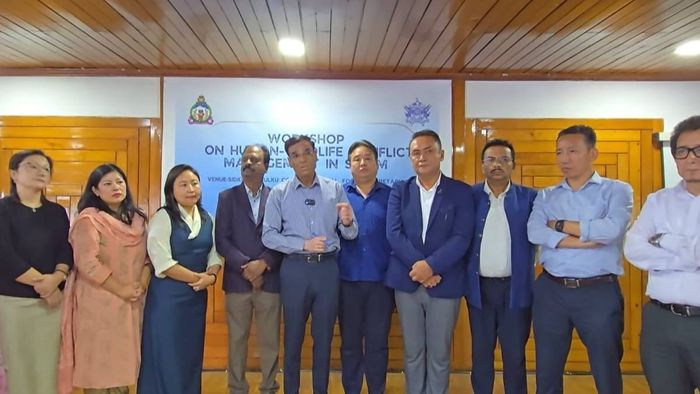Sikkim launches statewide strategy to tackle human-wildlife conflict
The Forest and Environment Department of Sikkim on Tuesday took a major step forward in combating the escalating issue of human-wildlife conflict by hosting a one-day state-level workshop on “Human-Wildlife Conflict Management in Sikkim” at the Forest Secretariat, Deorali. The workshop marks the first concrete operational step following a high-level government meeting chaired by Chief Minister Prem Singh Tamang on July 16.

- Jul 31, 2025,
- Updated Jul 31, 2025, 11:43 AM IST
The Forest and Environment Department of Sikkim on Tuesday took a major step forward in combating the escalating issue of human-wildlife conflict by hosting a one-day state-level workshop on “Human-Wildlife Conflict Management in Sikkim” at the Forest Secretariat, Deorali. The workshop marks the first concrete operational step following a high-level government meeting chaired by Chief Minister Prem Singh Tamang on July 16.
The initiative aims to craft a coordinated, sustainable, and locally driven strategy to mitigate the growing tensions between communities and wildlife. These tensions include incidents of crop destruction, livestock predation, and wildlife venturing dangerously close to human settlements—posing a threat to both people and biodiversity.
Presiding over the workshop, Principal Secretary-cum-Principal Chief Conservator of Forests (PCCF), Dr. Pradeep Kumar, emphasized the multi-sectoral nature of the challenge. “This is not just a forest department problem. Effective solutions must involve departments like agriculture, rural development, local governance bodies, and most importantly, the community itself,” he stated.
The workshop witnessed the presence of several key officials including Principal Director of Agriculture Tshering Thendup Bhutia, Chief Engineer of Rural Development Department Rinzing D. Gyaltsen, and Chief Wildlife Warden D. Manjunatha, IFS. Participants included divisional forest officers (DFOs), range officers (ROs), panchayat representatives, SARAH officials, and staff from various protected areas, ensuring diverse perspectives and ground-level insights.
Mr. D. Manjunatha delivered a detailed presentation outlining major areas of conflict such as crop raids, livestock loss, and shrinking buffer zones. He proposed solutions like solar-powered fencing, AI-based surveillance, and greenhouse enclosures, which were well received by field-level officers who also voiced their concerns and experiences.
Dr. Kumar assured attendees that the government is actively preparing a comprehensive conflict mitigation framework that includes rapid response teams, compensation mechanisms, and preventive infrastructure. He reiterated the government’s commitment to a participatory approach, saying, “This workshop is not just a consultation—it's a collaborative effort to build policies grounded in field realities.”